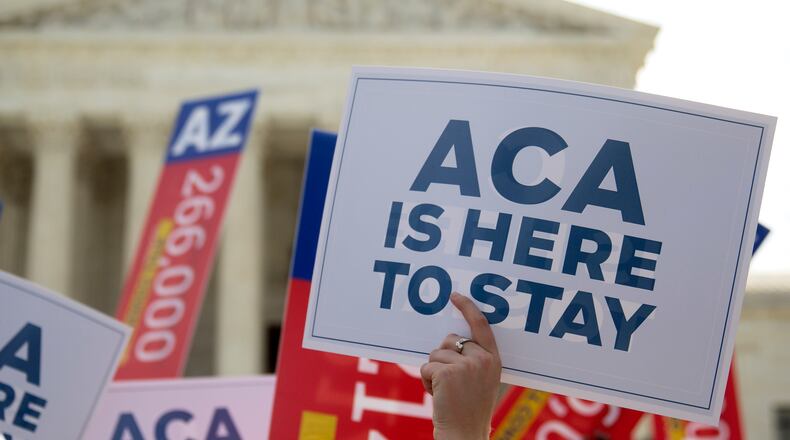We've posted the entire King v. Burwell decision for your perusal below, but we've also pulled out some of the key passages, minus the footnotes.
Chief Justice John Roberts wrote the majority opinion, while Justice Antonin Scalia wrote the blistering "SCOTUScare" dissent.
Love him or hate him, Scalia is always an entertaining read.
From Roberts and five other justices:
…When read in context, the phrase "an Exchange established by the State under" is properly viewed as ambiguous. The phrase may be limited in its reach to State Exchanges. But it could also refer to all Exchanges—both State and Federal—for purposes of the tax credits.
Here, the statutory scheme compels the Court to reject petitioners' interpretation because it would destabilize the individual insurance market in any State with a Federal Exchange, and likely create the very "death spirals" that Congress designed the Act to avoid…..
The combination of no tax credits and an ineffective coverage requirement could well push a State's individual insurance market into a death spiral. It is implausible that Congress meant the Act to operate in this manner…..
Petitioners' plain-meaning arguments are strong, but the Act's context and structure compel the conclusion that Section 36B allows tax credits for insurance purchased on any Exchange created under the Act. Those credits are necessary for the Federal Exchanges to function like their State Exchange counterparts, and to avoid the type of calamitous result that Congress plainly meant to avoid.
And from Scalia and two other justices:
In order to receive any money under §36B, an individual must enroll in an insurance plan through an "Exchange established by the State." The Secretary of Health and Human Services is not a State. So an Exchange established by the Secretary is not an Exchange established by the State—which means people who buy health insurance through such an Exchange get no money under §36B.
Words no longer have meaning if an Exchange that is not established by a State is "established by the State." It is hard to come up with a clearer way to limit tax credits to state Exchanges than to use the words "established by the State." And it is hard to come up with a reason to include the words "by the State" other than the purpose of limiting credits to state Exchanges….
Under all the usual rules of interpretation, in short, the Government should lose this case. But normal rules of interpretation seem always to yield to the overriding principle of the present Court: The Affordable Care Act must be saved….
We lack the prerogative to repair laws that do not work out in practice, just as the people lack the ability to throw us out of office if they dislike the solutions we concoct. We must always remember, therefore, that "[o]ur task is to apply the text, not to improve upon it."
… Rather than rewriting the law under the pretense of interpreting it, the Court should have left it to Congress to decide what to do about the Act's limitation of tax credits to state Exchanges. If Congress values above everything else the Act's applicability across the country, it could make tax credits available in every Exchange.
If it prizes state involvement in the Act's implementation, it could continue to limit tax credits to state Exchanges while taking other steps to mitigate the economic consequences predicted by the Court. If Congress wants to accommodate both goals, it could make tax credits available everywhere while offering new incentives for States to set up their own Exchanges. And if Congress thinks that the present design of the Act works well enough, it could do nothing. Congress could also do something else altogether, entirely abandoning the structure of the Affordable Care Act. The Court's insistence on making a choice that should be made by Congress both aggrandizes judicial power and encourages congressional lassitude….
Having transformed two major parts of the law, the Court today has turned its attention to a third. The Act that Congress passed makes tax credits available only on an "Exchange established by the State." This Court, however, concludes that this limitation would prevent the rest of the Act from working as well as hoped. So it rewrites the law to make tax credits available everywhere. We should start calling this law SCOTUScare.
Perhaps the Patient Protection and Affordable Care Act will attain the enduring status of the Social Security Act or the Taft-Hartley Act; perhaps not. But this Court's two decisions on the Act will surely be remembered through the years.
The somersaults of statutory interpretation they have performed ("penalty" means tax, "further [Medicaid] payments to the State" means only incremental Medicaid payments to the State, "established by the State" means not established by the State) will be cited by litigants endlessly, to the confusion of honest jurisprudence.
And the cases will publish forever the discouraging truth that the Supreme Court of the United States favors some laws over others, and is prepared to do whatever it takes to uphold and assist its favorites.
About the Author
The Latest
Featured




